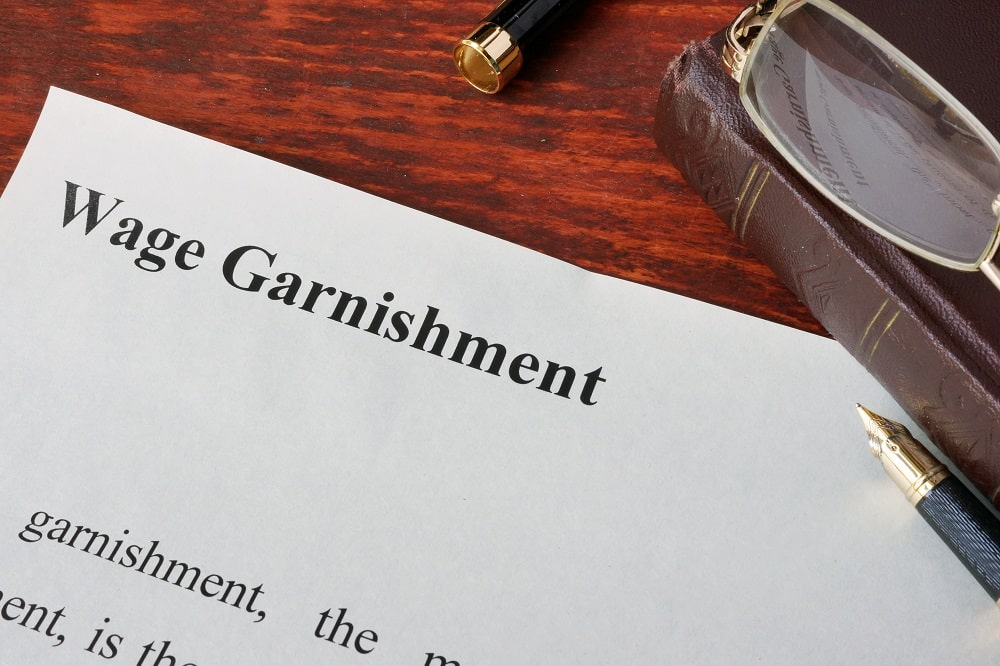
Welcome to the wild world of wage garnishment in the Garden State! If you’ve found yourself facing the dreaded prospect of having your hard-earned money snatched away by creditors, fear not. In this comprehensive guide, we’ll take you on a journey through New Jersey‘s labyrinthine wage garnishment laws, helping you navigate the twists and turns with humor and a healthy dose of reality. So buckle up, grab a cup of coffee (or your beverage of choice), and let’s dive into the murky waters of debt collection in the land of Bruce Springsteen and pork roll.
Understanding Wage Garnishment Laws in New Jersey
So you’ve found yourself in the Garden State and are now facing the dreaded prospect of wage garnishment. Don’t worry, I’ve got you covered with all the juicy details of New Jersey’s laws on this not-so-fun topic.
First off, let’s get one thing straight – New Jersey isn’t messing around when it comes to collecting debts. If you owe money, they will find a way to get it, even if it means dipping into your hard-earned paycheck.
Now, here’s the lowdown on how much can be garnished from your wages in the beautiful state of New Jersey:
- For ordinary debts, creditors can take up to 10% of your gross wages.
- If you owe child support or alimony, be prepared to fork over a whopping 55% of your paycheck. Ouch!
But hey, look on the bright side – at least you’ll have a valid excuse to not pick up the tab at Happy Hour this week!
Determining Eligibility for Wage Garnishment
So you’re considering wage garnishment, huh? Well, before you start dreaming about all the cash flowing into your bank account, you need to first determine if the person owes you enough money to make it worth your while!
Here are some factors to consider when :
- Is the person an employee? If they’re self-employed or unemployed, good luck trying to garnish their non-existent wages!
- Do they owe you a significant amount of money? If they only owe you a few bucks, it’s probably not worth the hassle of going through the garnishment process.
- Have you already tried other methods to collect the debt, like sending them threatening letters or hiring a collection agency? If so, and they still refuse to pay up, then it might be time to consider wage garnishment.
Remember, wage garnishment is not a decision to be taken lightly. It can be a long and tedious process, so make sure you’ve weighed all your options before diving in. And hey, if all else fails, you can always hire a professional to do the dirty work for you!
How Much of Your Wages Can Be Garnished?
Ever wondered just how much of your hard-earned cash can be snatched away by those pesky garnishments? Well, buckle up, because we’re about to break it down for you!
First things first, it’s important to know that federal law limits the amount that can be garnished from your wages. Typically, creditors can take up to 25% of your disposable earnings, or the amount by which your weekly earnings exceed 30 times the federal minimum wage, whichever is less. So, unless you’re ballin’ out of control, chances are you won’t be losing ALL of your paycheck.
But wait, there’s more! Certain types of debts, like child support or unpaid taxes, can result in even higher garnishment percentages. In some cases, these debts can lead to up to 50% of your disposable earnings being snatched away faster than you can say “ouch, my bank account!”
So, the next time you find yourself face-to-face with a garnishment notice, just remember to keep calm, consult with a financial expert, and find solace in the fact that at least you still have some control over your earnings. And hey, maybe consider switching to a more budget-friendly lifestyle to avoid those pesky garnishment woes in the future. Your wallet will thank you!
exemptions-for-employees”>Legal Protections and Exemptions for Employees
Are you tired of feeling like you have no rights in the workplace? Well, fear not! There are actually legal protections and exemptions in place to ensure that you don’t get completely steamrolled by your employer. Here are some of the key ways in which the law is on your side:
- Minimum wage laws: Your employer can’t just pay you in bubble gum and high fives. There are actual laws in place to ensure that you receive a fair wage for your hard work. So next time your boss tries to shortchange you, you can kindly remind them that you’re worth more than just sticky fingers.
- Discrimination protections: If your boss starts treating you differently because of your race, gender, religion, or any other protected characteristic, you can tell them to take a long walk off a short pier. Discrimination is illegal, and you have the right to stand up for yourself.
But wait, there’s more! Did you know that there are also exemptions for certain employees that can work in your favor? For example, if you’re a farm worker, a live-in domestic worker, or a fisherman, there are special rules that apply to you. So if you find yourself in one of these unique roles, make sure to brush up on your exemptions and take full advantage of them.
So remember, you’re not just a cog in the corporate machine – you’re a valuable employee with rights and protections. Don’t be afraid to speak up and advocate for yourself, because the law is on your side. And if all else fails, just remember: you can always call Saul.
Steps to Take if You’re Facing Wage Garnishment
So, you’ve found yourself in a bit of a pickle with wage garnishment. Don’t worry, it happens to the best of us! Here are some steps you can take to tackle this pesky situation:
- Don’t Panic: Take a deep breath and remember that you’re not alone. Countless people have faced wage garnishment before you, and they’ve come out on the other side just fine.
- Know Your Rights: Educate yourself on the laws and regulations surrounding wage garnishment in your area. Understanding your rights can help you navigate the process more effectively.
- Seek Legal Advice: It might be a good idea to consult with a lawyer who specializes in wage garnishment. They can provide you with expert guidance on how to handle the situation and protect your interests.
Remember, facing wage garnishment can be stressful, but it’s not the end of the world. By taking proactive steps and seeking help when needed, you can overcome this obstacle and come out on top!
The Role of Employers in the Wage Garnishment Process
So, you’re an employer and suddenly you’re faced with the daunting task of dealing with wage garnishments. Don’t worry, we’ve got you covered! Here’s a breakdown of your role in the wage garnishment process:
First things first, **communication** is key! Make sure to stay in touch with the employee who is having their wages garnished. Let them know that you’ve got their back (even if it means taking a little off the top).
Next, it’s time to roll up your sleeves and get **organized**. Keep detailed records of the garnishment order, deductions, and payments. It’s like a puzzle – just make sure all the pieces fit together nicely.
When it comes to actually deducting the wages, make sure to follow the garnishment order to a T. You don’t want to be the one responsible for messing up someone’s paycheck. That’s just bad karma (and potentially bad for your future payroll).
Seeking Legal Assistance for Wage Garnishment Issues
If you find yourself in a sticky situation with wage garnishment, fear not! Our team of legal experts is here to help you navigate through this messy ordeal.
Here are a few reasons why seeking legal assistance is the best way to handle wage garnishment issues:
- Expertise: Our lawyers are like wage garnishment wizards, casting spells to make those pesky garnishments disappear.
- Legal Know-How: We know all the loopholes and tricks of the trade to protect your hard-earned money from being snatched away.
- Peace of Mind: Let us handle the heavy lifting while you sit back, relax, and focus on more important things, like binge-watching your favorite show.
So don’t stress about wage garnishment any longer. Contact us today and let us work our legal magic to make your financial worries disappear!
FAQs
Will my entire paycheck be garnished if I owe money?
Oh no, not the whole enchilada! New Jersey sets limits on how much of your hard-earned cash can be snatched away. The maximum amount that can be garnished from your paycheck is 10% if you owe child support, and 25% for other debts. So you’ll still have some dough left over for those avocado toast brunches.
Can my employer fire me for having my wages garnished?
Ah, the age-old question of getting the boot for being in debt. The good news is, in New Jersey, employers are prohibited from firing you for having your wages garnished. It’s like having an invisible force field protecting your job security. So you can breathe a sigh of relief and keep on earning that moolah.
How long does a wage garnishment last in New Jersey?
Time flies when you’re having fun, but unfortunately, wage garnishments can stick around for a while. In New Jersey, a wage garnishment can last up to 20 years if you owe child support, and up to 10 years for other types of debt. That’s a long-term commitment that even some marriages can’t handle.
Is there a way to stop a wage garnishment in New Jersey?
Don’t worry, there’s light at the end of the tunnel! You can try to stop a wage garnishment in New Jersey by filing a claim of exemption. This is like waving a magic wand and saying, “Abracadabra, get out of my paycheck, you pesky garnishment!” Just make sure to follow the proper procedures and cross your fingers for a favorable outcome.
What happens if I ignore a wage garnishment in New Jersey?
Ignorance may be bliss, but when it comes to wage garnishments in New Jersey, ignorance can cost you big time. If you ignore a wage garnishment, the court can hold you in contempt, slap you with fines, or even throw you in the slammer. So don’t play hide-and-seek with your debts – face them head-on and avoid a world of trouble.
Time to Put Some Money Back in Your Pocket!
Congratulations for making it through this comprehensive guide on navigating New Jersey’s wage garnishment laws! Now that you’re armed with the knowledge to protect your hard-earned money, go forth and keep those garnishments at bay. Remember, money doesn’t grow on trees, so let’s make sure it stays in your pocket where it belongs! Happy financial freedom, folks!










